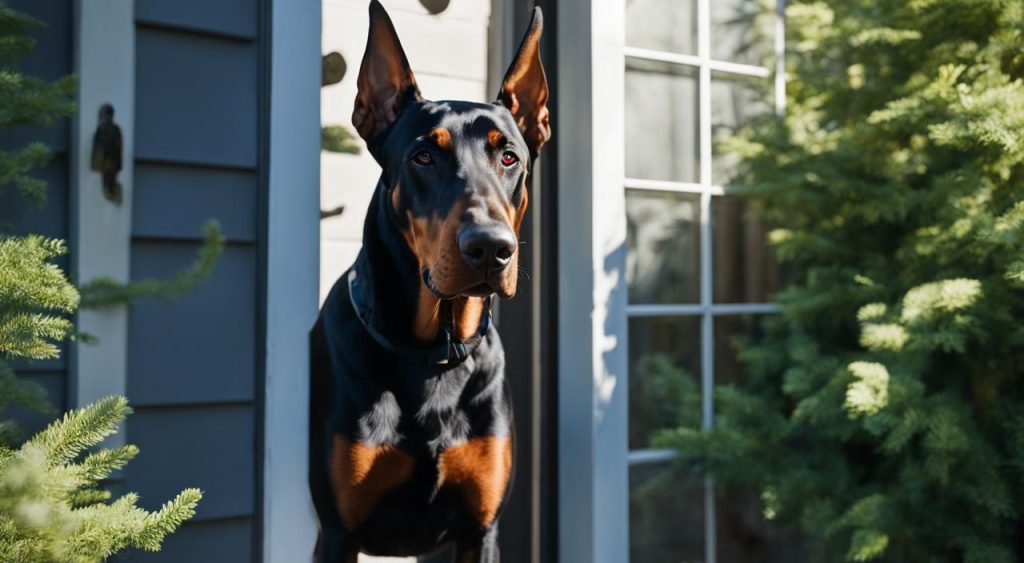Leaving your beloved Doberman alone can be a concern for many dog owners. You may wonder if they can handle being by themselves and if it’s safe to leave them at home. In this article, we will explore how long Dobermans can be left alone and what factors to consider before leaving them.
Dobermans can be left alone for up to 8 hours a day, but it is not recommended to leave them alone for longer periods. It’s important to keep in mind that adult Dobermans should not be left alone in a crate, but rather trusted to be outside of it. Make sure to provide them with plenty of water, chew toys, and exercise before leaving them alone. If you have a puppy, they require more attention and crate training is recommended.
Key Takeaways:
- Dobermans can be left alone for up to 8 hours a day.
- Adult Dobermans should be trusted outside the crate.
- Puppies require more attention and crate training.
- Provide plenty of water, chew toys, and exercise before leaving them alone.
- Create a routine to help your Doberman cope with being alone.
How Long Can You Leave a Doberman Alone?
When it comes to leaving your Doberman alone, it’s important to consider their temperament, age, and the duration of their solo time. On average, a Doberman can handle being left alone for about 3 to 8 hours before they start experiencing separation anxiety. However, this can vary depending on the individual dog.
If you have a puppy, their tolerance for being alone is much lower. Puppies can usually cope with being by themselves for only about 1 to 3 hours. They require more attention, care, and frequent potty breaks. It’s essential to gradually increase their alone time as they grow older and more independent.
On the other hand, adult Dobermans are generally more capable of handling longer periods alone. They can tolerate being by themselves for up to 12 hours, but it’s still important to ensure they have plenty of mental and physical stimulation to prevent boredom and anxiety.
It’s crucial to remember that these are general guidelines, and each Doberman is unique. Factors such as their past experiences, training, and overall temperament can influence their ability to tolerate being alone. Additionally, the consistency of leaving your Doberman alone can impact their comfort level.
While it’s tempting to have your Doberman keep you company for extended periods, it’s vital to prioritize their well-being and avoid causing unnecessary stress. Providing them with ample exercise, mental stimulation, and ensuring their physical needs are met before leaving can help them cope better with being alone.
Remember, a happy and well-adjusted Doberman is one that feels secure and loved, even when you’re not physically present.
Factors to Consider Before Leaving Your Doberman at Home
When it comes to leaving your Doberman at home, there are several factors to consider to ensure their well-being and comfort. Understanding the age and temperament of your Doberman plays a crucial role in creating a positive experience for them when they are left alone.
If you have a puppy or an older Doberman, they may require more frequent bathroom breaks compared to adult dogs. It’s important to take their bathroom needs into consideration and provide them with access to appropriate areas or create a routine that allows for regular breaks.
Creating a routine for your Doberman can help them feel secure and establish a sense of predictability. Spending quality time with your furry friend before leaving can help alleviate any separation anxiety they may feel. This can include engaging in interactive play, going for walks, or simply cuddling with them.
“By creating a positive and reassuring environment before you leave, you can help your Doberman feel more comfortable and confident during their alone time.”
Regular exercise is key to keeping your Doberman physically and mentally stimulated. Before leaving, make sure to provide them with plenty of exercise, such as walks, runs, or interactive toys that encourage mental engagement. This can help tire them out and make their alone time more manageable.
To prevent unnecessary stress, it’s important to maintain consistent feeding times for your Doberman. This will not only keep them on a regular schedule but also ensure their comfort and prevent any digestive issues that may arise from feeding at irregular intervals.
By taking these factors into consideration and implementing appropriate measures, such as creating a routine, spending quality time, providing exercise, and maintaining consistent feeding times, you can help train your Doberman to be more comfortable when left alone.
Conclusion
Dobermans can be left alone for a certain period of time, but it’s important to be mindful of their separation anxiety and potential stress when left alone for too long. To ensure their well-being and happiness during solo time, it’s essential to provide them with the necessary attention, exercise, and mental stimulation.
One helpful tool in managing their alone time is crate training. While adult Dobermans should not be left alone in a crate for extended periods, using a crate can provide a safe and comfortable space for them when you’re away for shorter durations. Remember to gradually introduce your Doberman to the crate and make it a positive experience.
Additionally, establishing a routine can help alleviate separation anxiety. Maintain consistency in your departure and arrival times, ensuring your Doberman knows when to expect your absence and return. Spending quality time with your Doberman before leaving them alone and providing them with plenty of exercise can also help them cope better with solo time.
To prevent stress and keep your Doberman mentally stimulated, provide them with interactive toys and puzzles that challenge their minds. Mental stimulation can reduce anxiety and keep them occupied while you’re away. Remember to keep their environment safe, secure, and free of hazards to ensure their well-being.





